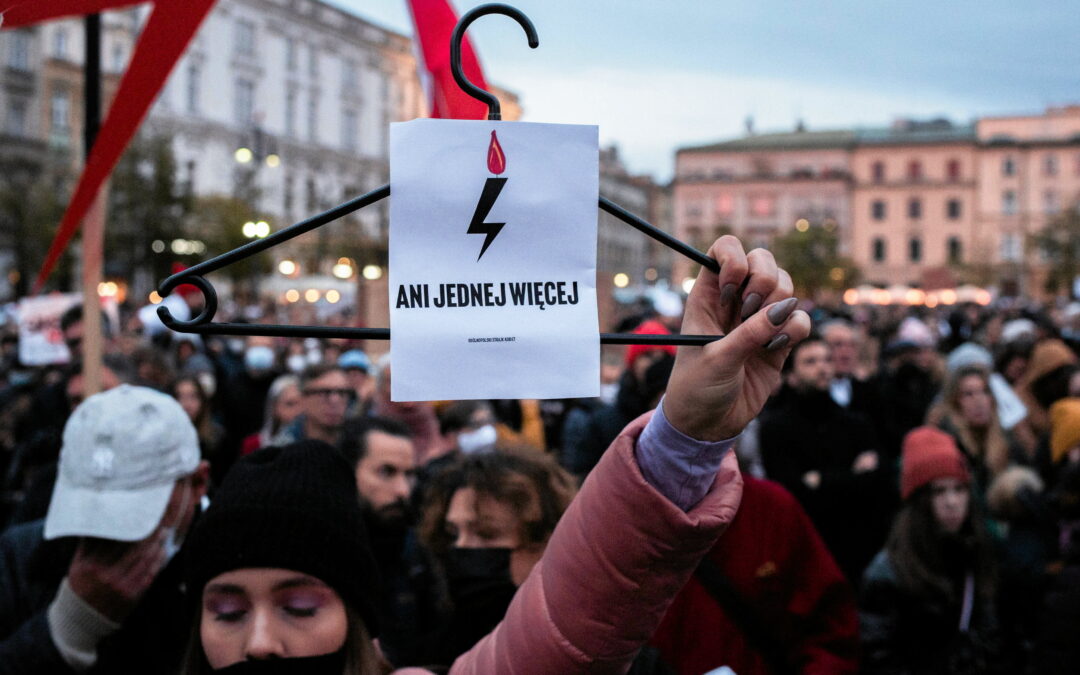Poland’s health ministry has issued new guidance to hospitals on treating complications in pregnancies after a woman died following a decision by doctors to wait for her foetus to die before removing it. Many have blamed their decision on last year’s introduction of a near-total ban on abortion.
As silent protests took place in many cities and towns throughout Poland following the death of the woman in hospital in Pszczyna, the health minister hinted that doctors treating her may have feared legal repercussions for terminating the abortion.
Since news of the death of that woman, named Izabela, came to light, a number of other similar cases of women dying – or being at risk of dying – due to doctors’ reluctance to terminate pregnancies have been published in the media.
Sound of silence #anijednejwiecej pic.twitter.com/Y546bnEN1J
— Jakub Wende (@JakubWende) November 6, 2021
“The death of the 30-year-old woman admitted to hospital in Pszczyna is a very difficult issue,” said Adam Niedzielski, the health minister. “One that will be investigated by the prosecutor’s office and the National Health Fund.”
“Perhaps the interpretation of last year’s ruling could have resulted in a doctor being afraid to make a decision,” added Niedzielski, referring to last year’s decision by the Constitutional Tribunal that made nearly all abortions illegal. Such doubts should be clarified by the publication of a new set of guidelines entitled “The mother’s life and health are most important”, he said.
The document outlines the necessary procedures and stresses that if there is a threat to a pregnant woman’s life, including suspicion of infection in the uterus or haemorrhage, current regulations allow termination of the pregnancy.
The law “clearly specifies that risk to mother’s life or health constitutes a premise [for terminating a pregnancy],” said Niedzielski. He added that “it is enough for one of these premises to occur for a doctor to react”.
In the guidelines, the ministry point out that the patient has to be informed at every stage of prenatal care about any risks to her health or life.
“We have to fully stress that doctors can’t be afraid of taking obvious decisions, based on their experience and current medical knowledge,” the ministry wrote. The document lists a number of procedures that should be followed in each instance of premature rupture of membranes.
Niedzielski, who previously ordered an audit in the hospital in which Izabela died, has also asked the head of the National Health Fund to monitor all the instances throughout the country in which the life or health of pregnant women could be at risk.
Meanwhile, amid the weekend’s large-scale protests over the death, other stories emerged showing that this might have not been an isolated case. One of them took place in mid-June in Świdnica in southwestern Poland.
“My wife Ania was told to give birth to a dead child,” recalls her husband, who after reading about what happened in Pszczyna decided to talk to the media. “It’s the same situation,” he told Gazeta Wyborcza.
Agnieszka w ciąży pozamacicznej usłyszała w szpitalu w Kaliszu: Mamy związane ręce, musimy czekać https://t.co/tzfYLPG3MK
— Bartosz T. Wieliński 🇵🇱💯 (@Bart_Wielinski) November 7, 2021
According to her husband, Ania was brought to the hospital in the fifth month of pregnancy as she was feeling unwell. After she was admitted and examined, it turned out that the foetus was no longer alive. Soon Ania developed a high fever.
“The medical staff knew about this, yet still they told her to give birth,” the husband told Onet. Ania, like Izabela from Pszczyna, died of septic shock within 24 hours of admission to the hospital.
“When I read about Iza, I realised it could have been me. I could have orphaned two kids,” said Agnieszka from Kalisz, who told Gazeta Wyborcza that she was denied a termination of an ectopic pregnancy, with doctors saying “that’s the climate we have at the moment”.
A new poll shows that a large majority of people in Poland want the country’s abortion law to be liberalised. The findings follow similar results in previous surveys.
Many conservative figures have, however, argued that the tragedy has nothing to do with the abortion law, which they note still allows for pregnancies to be terminated if they threaten the health or life of the mother.
Ordo Iuris, an ultraconservative organisation that lobbied for the restriction of abortion in Poland, has argued that the tragedy is the result of medical malpractice and criticised those who blame it on the abortion law.
The state broadcaster TVP, which serves as a government mouthpiece, accused the opposition of playing “a political game with a tragic death”.
Main image credit: Adrianna Bochenek/Agencja Wyborcza.pl

Agnieszka Wądołowska is deputy editor-in-chief of Notes from Poland. She is a member of the European Press Prize’s preparatory committee. She was 2022 Fellow at the Entrepreneurial Journalism Creators Program at City University of New York. In 2024, she graduated from the Advanced Leadership Programme for Top Talents at the Center for Leadership. She has previously contributed to Gazeta Wyborcza, Wysokie Obcasy and Duży Format.




















